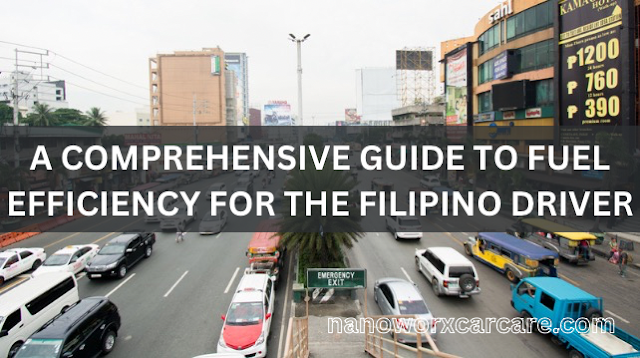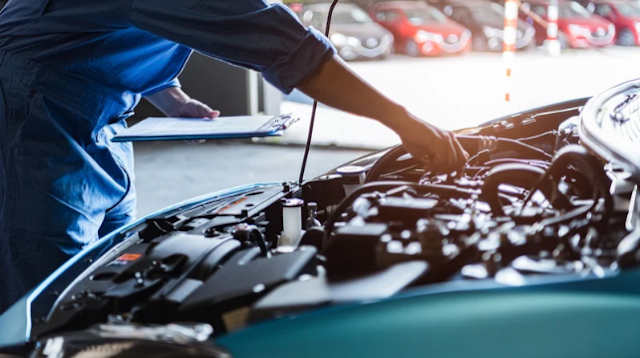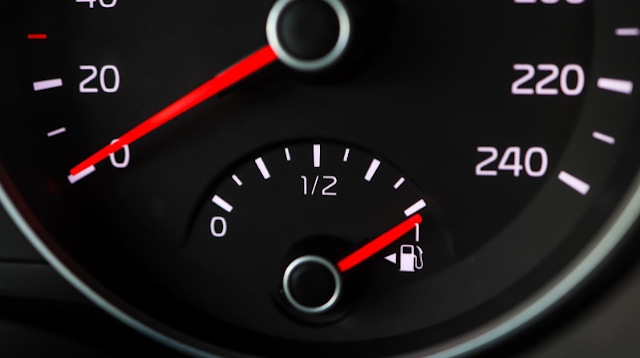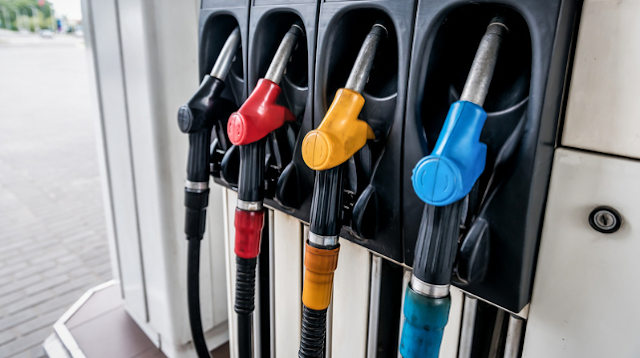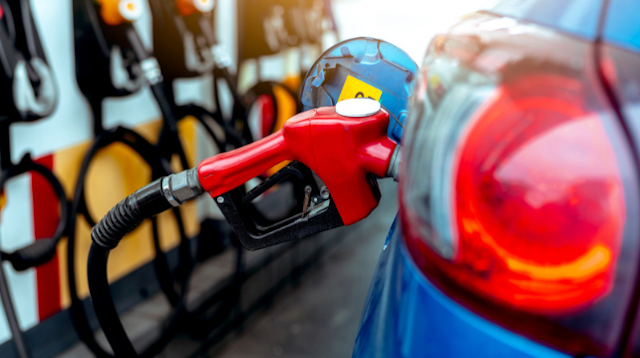A Comprehensive Guide to Fuel Efficiency for Filipino Drivers
Have you ever been at the gas station, wincing at the rising fuel prices? You're not alone.
In the Philippines, where the hustle of city traffic mingles with the serene drives of the countryside, managing fuel consumption can be quite a challenge.
But why precisely should we, as Filipinos, focus on fuel efficiency? For starters, every drop of fuel saved is a peso earned. And there's the bonus of helping our environment by reducing emissions.
Imagine cruising through EDSA without worrying about your fuel gauge dropping too quickly or enjoying a long drive via SLEX or NLEX to nearby provinces, knowing you've maximized every liter.
It's not just a dream; it's a highly achievable reality.
From simple vehicle maintenance checks and the art of smooth driving to leveraging modern technology and making smart daily choices—we've got you covered.
So whether you're behind the wheel of a spritely hatchback navigating the vibrant streets of Manila or a large SUV exploring the scenic routes of Baguio City, these tips are for everyone.
And the best part? You don't need to be a car guru to understand them. So, buckle up as we embark on this journey towards a more fuel-efficient driving experience.
Understanding Fuel Efficiency in the Philippines
As Filipinos, we have an intimate relationship with our vehicles—they are part of our family. And just like any significant relationship, it thrives on understanding and care, especially regarding fuel efficiency.
What's the Deal with Fuel Efficiency?
Fuel efficiency is about stretching that precious liter of gasoline or diesel as far as it can go. It's like being on a mission to make the most of every drop.You aim to travel the furthest distance, using the least fuel. It's a magic trick, but we're pulling extra kilometers out of our fuel tanks instead of pulling rabbits out of hats.
Factors That Drive Your Efficiency
When you're out and about on the roads, whether it's the bustling streets of Quezon City or the laid-back lanes of Ilocos, a few things are constantly at play under the hood.- Traffic Tango: Ah, the daily dance of stop-and-go. Our local traffic scenario can be a significant fuel drainer. The more you start and stop, the more fuel you gulp down. It's like taking small sips of your drink versus gulping it down; the latter finishes it faster.
- Fuel's DNA: Not all gas is created the same. The type and quality of fuel you pump into your car make a big difference. Sub-par fuel can be like a bad meal for your car—it doesn't 'digest' well and wastes energy.
- Driving Habits: This is all about your personal touch. Aggressive driving with careless acceleration and hard braking is a surefire way to guzzle more gas. It's like running versus walking; one will tire you out and use more energy much faster.
- Car Health: A well-maintained car is a happy car. Like you, your car performs best when it's taken care of with regular maintenance, proper tire inflation, and timely oil changes.
- The Hidden Costs of Low Efficiency: Driving a gas guzzler hits more than just your wallet at the fuel station. It can lead to more frequent service issues and affect your car's resale value. Plus, there's the time cost of all those extra trips to the gas station.
Eco-Friendly Driving: Every Bit Counts
Beyond personal savings, being mindful of fuel efficiency is how we care for our environment. Each efficiently burned drop of fuel means fewer emissions and a cleaner Philippines for generations to come.Optimal Vehicle Maintenance
Maintaining your car is like caring for your health; preventative measures are always better than a cure. And when it comes to cars, a well-tuned machine doesn't just run better—it sips fuel instead of guzzling it.
The Heartbeat of Your Car: The Engine
A healthy heart is critical for your well-being; the same goes for your car's engine. Regular engine check-ups are crucial.This means changing the oil as recommended, ensuring the cooling system works properly, and the timing belts are in good shape. A well-maintained engine operates efficiently, burns fuel properly, and saves money.
Rolling on Air: Tire Pressure
Your tires are where your car meets the road, literally. Driving on tires with the correct pressure level is like wearing shoes that fit just right—you move better, and so does your car.Under-inflated tires can increase rolling resistance, so your engine must work harder to move your car, leading to higher fuel consumption.
Breathing Easy: Clean Air Filters
Your car breathes, just like you. And it needs a clean air filter to breathe easily.A clogged filter restricts airflow to the engine, which can cause a rich fuel mixture—meaning your engine burns more fuel than needed. Replacing a filthy air filter can improve your mileage, reduce emissions, and improve engine performance.
The Weight Factor
The more weight you carry, the more energy you need to move. It's simple physics.For your car, extra weight means more work for the engine and more fuel burned. Keeping your car clutter-free and only carrying necessities can significantly impact your fuel efficiency.
Smart Driving Habits
No matter how well maintained, a car is only as efficient as the person behind the wheel. It's time to get familiar with smart driving habits that will help you save fuel and get more out of every trip.
Smooth Sailing with Acceleration and Braking
Remember the last time you were late and had to rush? Your heart raced, and you felt exhausted afterward. Your car feels the same when you accelerate too quickly or brake too hard.These actions can be heavy on fuel consumption. Instead, accelerate gradually and anticipate your stops to brake smoothly. It's like the difference between jogging and sprinting — one gets you there efficiently without wearing you out; the same goes for your car.
Traffic Navigation: It's All About Timing
The Philippines' traffic can be unpredictable, but with some planning, you can avoid the worst of it. Choosing the right time to travel and planning your route can save you from the stop-start rhythm of heavy traffic, which is notorious for draining your fuel tank.Applications like Google Maps and Waze can be invaluable tools, helping you find the most efficient route to your destination.
Gear Up for Efficiency
For those driving a manual transmission, your gear can impact fuel consumption.The higher the gear, the lower the engine speed, which can mean better fuel efficiency. So, shift up early when you can, but don't lug the engine — that can be just as bad as over-revving.
The Stop-and-Go Dilemma
The stop-and-go can eat up fuel in traffic-heavy areas like Metro Manila. Minimizing this can save a lot of gas over time.One trick is to keep a reasonable distance from the car ahead, allowing you to keep rolling slowly instead of coming to a complete stop.
Utilizing Technology for Fuel Efficiency
In the ever-evolving landscape of automotive technology, some pretty nifty tools are available to help us drive more efficiently. By embracing these advancements, we can enhance our driving experience and contribute to a more significant cause—reducing our carbon footprint.
Dashboard Wisdom: Fuel Economy Displays
Modern cars often have a dashboard display that provides real-time fuel economy data. This feature is like having a financial advisor for your fuel spending—it gives you instant feedback on the impact of your driving habits.By monitoring this closely, you can adjust your driving in real time to become more fuel-efficient.
Cruise Control: The Highway Companion
Long drives on the NLEX or SLEX can be more than just a test of patience—they can be a fuel drain. That's where cruise control comes in.By maintaining a constant speed on open highways, cruise control can help reduce fuel consumption, as it minimizes the unnecessary acceleration and deceleration that typically occurs with manual speed adjustments.
Eco-Driving Features: Let Your Car Help You
Many cars now offer eco-driving features that automatically adjust the engine and transmission settings for optimal fuel efficiency. By managing your car's performance, these systems take the guesswork out of efficient driving.It's like having an expert co-pilot dedicated to saving fuel.
Apps That Keep You On Track
Apart from what's built into your car, there are also mobile apps designed to help you track your fuel consumption. These apps can analyze your driving patterns and offer personalized tips to improve efficiency.It's like a fitness tracker, but for your car—it helps you set goals, monitor progress, and celebrate your efficiency achievements.
Fuel-Saving Tips for Everyday Driving
We've talked about how your car's health and technology can impact fuel efficiency, but what about the everyday tips and tricks that can make a difference with every turn of the key? You can implement these practical steps today, no matter what car you drive.
Idle Thoughts: The Truth About Idling
Let's bust a myth: idling to "warm up" the engine is necessary. Modern engines don't require long warm-ups — they're ready to go in just a few seconds.Idling is just burning fuel without going anywhere. So, if you're waiting to pick someone up or stuck in a long queue at the Jollibee drive-thru, turn off the engine if it's safe. Your fuel tank (and wallet) will thank you.
Air Conditioning vs. Windows Down: The Great Debate
The Filipino heat can be relentless, and air conditioning feels like a sanctuary. But did you know that using the AC can increase fuel consumption? At lower speeds, consider rolling down the windows to keep cool.However, when you hit higher speeds, closed windows are best, as open windows create drag, which can decrease fuel efficiency.
Momentum is Your Friend
Driving is all about momentum. The trick is to use it wisely. When approaching a red light, ease off the accelerator early — let your car coast down as much as possible before braking.This way, you're using the energy you've already put into the car rather than burning more fuel to keep it going.
Carpooling: Sharing is Caring (for Your Fuel Gauge)
Carpooling isn't just a way to catch up with friends or make new ones; it's also a brilliant strategy to cut down on fuel costs.Fewer cars on the road means less traffic, and sharing rides means sharing the cost of fuel among passengers. It's a win-win situation!
Fuel-Efficient Driving in Urban vs. Rural Settings
The Philippines offers diverse driving environments, each with its own challenges and opportunities for fuel efficiency. Whether navigating the busy streets of the metro or cruising through the provincial roads, different strategies can help you maximize your fuel economy.
Urban Efficiency: Mastering the Metro Maze
Driving in the city is all about strategy. The constant stop-and-go can take a toll on your fuel gauge if you're not careful.- Timing Your Travel: In the city, timing is everything. Travel during off-peak hours whenever possible to avoid the gridlock.
- Smooth Operations: Accelerate smoothly from stops and anticipate traffic lights to avoid unnecessary braking and acceleration.
- Intelligent Parking: Look for accessible parking spots to get in and out of to minimize driving time at low speeds, which consumes more fuel.
Rural Road Wisdom: Savoring the Scenic Sip
Out on the open roads, it's a different ballgame. Here, you can stretch your car's legs and fuel.- Steady Speeds: Maintaining a consistent speed on long stretches of road is more fuel-efficient than fluctuating speeds.
- Hill Strategy: Use the momentum of downhill stretches to help you climb the next hill rather than accelerating hard at the base.
- Nature's AC: In rural areas, you might not need the AC as much. Enjoy the fresh air, but remember to roll up the windows if you're going fast.
Beyond Driving – Comprehensive Fuel Saving
While smart driving and vehicle maintenance play pivotal roles in fuel efficiency, there's a broader canvas to consider. Saving fuel isn't confined to the driver's seat; it extends into our daily choices and lifestyle habits.
Let's take a holistic look at embracing a fuel-efficient lifestyle beyond just driving techniques.
Choosing the Right Fuel: Not All Gasoline Is Created Equal
In the Philippines, we have options when it comes to fueling up. Using the best octane fuel for your car is essential.While premium fuels cost more, they only translate into better fuel economy for some vehicles. Stick to your car's manufacturer's recommendations and consider fuel quality over price alone.
Public Transit and Alternative Transportation: Embrace the Commute
Our local jeepneys, buses, and the MRT/LRT can be more than just a way to get around—they're a ticket to reducing your carbon footprint. On days when driving isn't essential, consider these alternatives.Plus, the occasional commute can be a refreshing break from the monotony of driving, not to mention the fuel savings.
Lifestyle Shifts: The Bigger Picture
The way we live influences our fuel consumption. Something as simple as combining errands into one trip can significantly reduce fuel use.Also, consider the impact of telecommuting, cycling, or walking for shorter distances. These choices contribute to both personal health and the well-being of our environment.
Staying Informed: Knowledge Is Power (And Savings)
Keep abreast of the latest fuel-efficient technologies and practices. Follow blogs, join forums, and participate in local community discussions about fuel-saving techniques.Being informed empowers you to make better choices for yourself and the environment.
Fueling Our Journey Forward
As we wrap up our fuel efficiency journey, we reflect on the key learnings that can empower every Filipino driver. It's clear now that fuel efficiency stretches beyond the car—it's about our driving habits, regular maintenance, the embrace of technology, and the choices we make every day.
From the smooth acceleration and braking to the wise use of air conditioning and strategic route planning, we've seen how simple, everyday actions can contribute to significant savings. We've learned that there are always ways to stretch our fuel further, whether in congested city traffic or on open provincial roads.
And beyond the road, we've discovered that lifestyle choices—like using the right fuel, opting for public transport, and staying informed—play a vital role in fuel-saving endeavors.
Let's carry forward this mindset, where every drop of fuel saved is a victory for our wallets and environment. As we continue on our paths, let's commit to these practices, not just for the immediate benefits but for the sustainable future of our beloved Philippines.
Let's make each journey count with mindfulness and efficiency at the helm of our travels.
